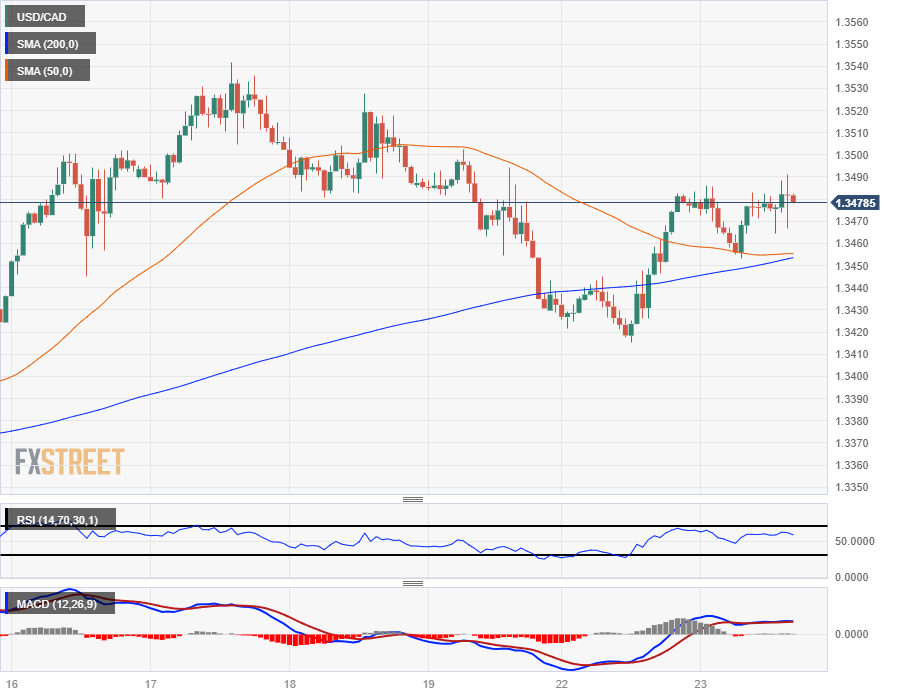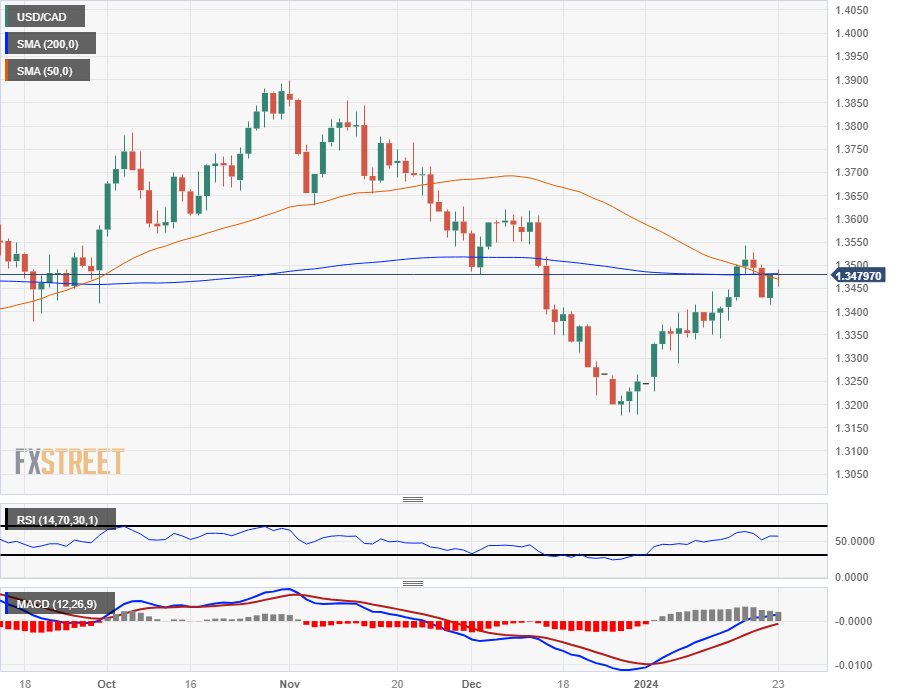- Phân tích
- Tin tức và các công cụ
- Tin tức thị trường
- Canadian Dollar chained to risk sentiment on Tuesday ahead of midweek BoC rate call
Canadian Dollar chained to risk sentiment on Tuesday ahead of midweek BoC rate call
- Canadian Dollar flows follow the broader market.
- Bank of Canada rate call looms on Wednesday.
- Crude Oil on the high side bolsters Canadian Dollar.
The Canadian Dollar (CAD) is mostly steady on Tuesday as broad-market sentiment dictates the flow of CAD pairs as Loonie traders buckle down ahead of the Bank of Canada’s (BoC) latest rate call and subsequent press conference. Crude Oil markets are tipped into the high end heading into the mid-week, keeping the Canadian Dollar propped up and preventing pre-BoC pullbacks in the near term.
Canada saw new home prices flatten in December and decline on an annualized basis, but Canada’s housing bubble remains one of the worst in the G20 of developed economies with housing affordability at its worst in over four decades. Runaway home prices are expected to crimp economic growth and tilt the Canadian domestic economy into a recession in the first half of 2024.
Daily Digest Market Movers: Canadian Dollar traders pull to the middle ahead of BoC
- BoC rate call and monetary policy statement due on Wednesday, Canadian Dollar traders benched ahead of central bank statement release.
- CAD gains in Loonie pairs result from headline-driven weaknesses in peer currencies.
- Canada’s New House Price Index flatlined at 0.0% in December compared to the previous month’s -0.2%.
- New home prices in Canada eased 0.9% for the year ended December, in-line with the previous figure.
- Despite a near-term loosening of Canadian housing price growth, Canada sees one of the worst housing affordability ratios in the G20.
- Bank of Montreal (BMO) Chief Economist Doug Porter noted that Canada has entered a recession shortly after the last three runaway spikes in housing unaffordability.
- Crude Oil markets are on the high end on Tuesday, bolstering the Canadian Dollar with West Texas Intermediate (WTI) US Crude Oil holding between $75.00 and $73.00 per barrel.
Canadian Dollar price today
The table below shows the percentage change of Canadian Dollar (CAD) against listed major currencies today. Canadian Dollar was the strongest against the Euro.
| USD | EUR | GBP | CAD | AUD | JPY | NZD | CHF | |
| USD | 0.36% | 0.25% | 0.00% | 0.02% | 0.16% | -0.04% | 0.20% | |
| EUR | -0.36% | -0.11% | -0.36% | -0.34% | -0.20% | -0.40% | -0.16% | |
| GBP | -0.25% | 0.11% | -0.26% | -0.24% | -0.10% | -0.30% | -0.06% | |
| CAD | 0.00% | 0.37% | 0.27% | 0.04% | 0.16% | -0.03% | 0.21% | |
| AUD | -0.02% | 0.34% | 0.23% | -0.03% | 0.14% | -0.06% | 0.18% | |
| JPY | -0.15% | 0.19% | 0.08% | -0.17% | -0.13% | -0.19% | 0.03% | |
| NZD | 0.02% | 0.38% | 0.29% | 0.03% | 0.05% | 0.18% | 0.23% | |
| CHF | -0.22% | 0.16% | 0.05% | -0.21% | -0.19% | -0.04% | -0.25% |
The heat map shows percentage changes of major currencies against each other. The base currency is picked from the left column, while the quote currency is picked from the top row. For example, if you pick the Euro from the left column and move along the horizontal line to the Japanese Yen, the percentage change displayed in the box will represent EUR (base)/JPY (quote).
Technical Analysis: CAD sees gains as counterpart currencies shed weight
The Canadian Dollar (CAD) is getting propped up against the broader currency market on Tuesday as the Loonie’s major currency peers waffle heading into the middle of the week. The Canadian Dollar is on the high side against the Euro (EUR) by four-tenths of a percent, while gaining over a quarter of a percent against the Pound Sterling (GBP) and the Swiss Franc (CHF) as the European bloc currencies wither on market sentiment.
The US Dollar (USD) is holding mostly flat against the Canadian Dollar on Tuesday with the USD/CAD rotating sideways on the day. The pair hit an intraday low of 1.3453 before rebounding back within range of Tuesday’s opening bids of 1.3478.
The Dollar-Loonie pair caught a bounce from the 200-hour Simple Moving Average (SMA) on Monday near 1.3415, and the pair is holding on the high side ahead of headline drivers in the mid-week market session on Wednesday.
The USD/CAD continues to get mired in technical congestion between the 50-day and 200-day SMAs, with price action consolidating near the 1.3450 to 1.3500 region. The pair is currently trading up 2.3% from December’s swing low into 1.3177.
USD/CAD Hourly Chart
USD/CAD Daily Chart
Canadian Dollar FAQs
What key factors drive the Canadian Dollar?
The key factors driving the Canadian Dollar (CAD) are the level of interest rates set by the Bank of Canada (BoC), the price of Oil, Canada’s largest export, the health of its economy, inflation and the Trade Balance, which is the difference between the value of Canada’s exports versus its imports. Other factors include market sentiment – whether investors are taking on more risky assets (risk-on) or seeking safe-havens (risk-off) – with risk-on being CAD-positive. As its largest trading partner, the health of the US economy is also a key factor influencing the Canadian Dollar.
How do the decisions of the Bank of Canada impact the Canadian Dollar?
The Bank of Canada (BoC) has a significant influence on the Canadian Dollar by setting the level of interest rates that banks can lend to one another. This influences the level of interest rates for everyone. The main goal of the BoC is to maintain inflation at 1-3% by adjusting interest rates up or down. Relatively higher interest rates tend to be positive for the CAD. The Bank of Canada can also use quantitative easing and tightening to influence credit conditions, with the former CAD-negative and the latter CAD-positive.
How does the price of Oil impact the Canadian Dollar?
The price of Oil is a key factor impacting the value of the Canadian Dollar. Petroleum is Canada’s biggest export, so Oil price tends to have an immediate impact on the CAD value. Generally, if Oil price rises CAD also goes up, as aggregate demand for the currency increases. The opposite is the case if the price of Oil falls. Higher Oil prices also tend to result in a greater likelihood of a positive Trade Balance, which is also supportive of the CAD.
How does inflation data impact the value of the Canadian Dollar?
While inflation had always traditionally been thought of as a negative factor for a currency since it lowers the value of money, the opposite has actually been the case in modern times with the relaxation of cross-border capital controls. Higher inflation tends to lead central banks to put up interest rates which attracts more capital inflows from global investors seeking a lucrative place to keep their money. This increases demand for the local currency, which in Canada’s case is the Canadian Dollar.
How does economic data influence the value of the Canadian Dollar?
Macroeconomic data releases gauge the health of the economy and can have an impact on the Canadian Dollar. Indicators such as GDP, Manufacturing and Services PMIs, employment, and consumer sentiment surveys can all influence the direction of the CAD. A strong economy is good for the Canadian Dollar. Not only does it attract more foreign investment but it may encourage the Bank of Canada to put up interest rates, leading to a stronger currency. If economic data is weak, however, the CAD is likely to fall.
© 2000-2026. Bản quyền Teletrade.
Trang web này được quản lý bởi Teletrade D.J. LLC 2351 LLC 2022 (Euro House, Richmond Hill Road, Kingstown, VC0100, St. Vincent and the Grenadines).
Thông tin trên trang web không phải là cơ sở để đưa ra quyết định đầu tư và chỉ được cung cấp cho mục đích làm quen.
Giao dịch trên thị trường tài chính (đặc biệt là giao dịch sử dụng các công cụ biên) mở ra những cơ hội lớn và tạo điều kiện cho các nhà đầu tư sẵn sàng mạo hiểm để thu lợi nhuận, tuy nhiên nó mang trong mình nguy cơ rủi ro khá cao. Chính vì vậy trước khi tiến hành giao dịch cần phải xem xét mọi mặt vấn đề chấp nhận tiến hành giao dịch cụ thể xét theo quan điểm của nguồn lực tài chính sẵn có và mức độ am hiểu thị trường tài chính.
Sử dụng thông tin: sử dụng toàn bộ hay riêng biệt các dữ liệu trên trang web của công ty TeleTrade như một nguồn cung cấp thông tin nhất định. Việc sử dụng tư liệu từ trang web cần kèm theo liên kết đến trang teletrade.vn. Việc tự động thu thập số liệu cũng như thông tin từ trang web TeleTrade đều không được phép.
Xin vui lòng liên hệ với pr@teletrade.global nếu có câu hỏi.















